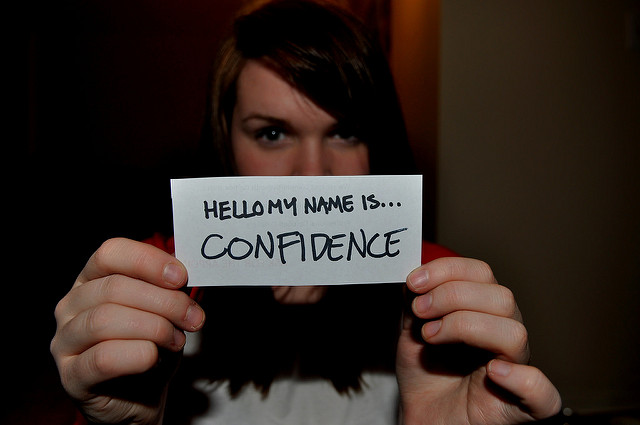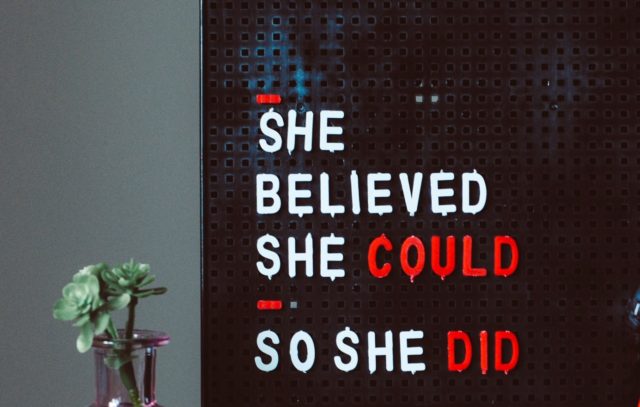Did Covid Kill Your Confidence? Here’s how to Reclaim It.

IF NOT YOU, THEN WHO? HAVE CONFIDENCE, EXPERIENCE WILL FOLLOW
Your risk disposition will prepare and position you, mentally speaking, for taking on risk. These qualities, though, need a friend to help them believe that achievement is possible. That friend is none other than confidence.
We love this topic, so much so that we’ve developed entire full-day courses on this topic alone. What’s always interesting is the intrigue around this skill, as well as the debate about its origin, especially when we ask a simple, semi-leading question in our workshops:
What comes first—experience or confidence?
In other words, does experience give you confidence to try new things, or does confidence give you experience to find new experiences? (We’ll let you think on that for a second.)
What we’ve discovered is that in nearly every classroom the group is split. Half will make a brilliant case for why you must have experience before you build confidence. The other half will tell you that you must have confidence to even put yourself in a position to build experience.
So, what’s the right answer? While we could make a great case for either viewpoint, we’ll have to say we tip the scale toward the need for confidence before experience.
Experience often takes years to develop, and you can feel as if you never seem to have enough to take on whatever it is that you want to do. Confidence is an emotion, one that can be managed in an instant to give you the courage to act. You can’t have one without the other. And, when it comes to taking risks, you’ll need confidence to take the wheel, because you’re stepping into areas where you have no firsthand experience.

Betting on yourself requires you to realize the value of you. That realization starts with believing in yourself when tested, which is the true definition of confidence. What’s always interesting is when it comes to our challenges, there are times when we believe in others much more than ourselves. You need to resist this temptation to trust others to solve your challenges—you’ve got enough talent, capability, intellect, and drive to achieve whatever it is you’ve got on your mind. But it’s not enough for us, or others, to believe this. You must, too.
BUILDING SELF-CONFIDENCE
Your personal confidence is built through taking risks that get you into the arena of experiences. Not uninformed, haphazard risks, but through your ability to define something you want to do and then committing to the process of doing it. If you want to run a faster 5K, for example, the simple way to describe how you’d meet that goal would be to evaluate your current time, then set a goal time, and then do the work to achieve your goal—to narrow the performance gap that exists.
Yet we know that most goals worth achieving are rarely that one dimensional. To run a faster 5K, it might not just come down to running. You might research nutrition, understanding what your body needs to perform at a better level. Or you might look up a running plan from a well-respected coach to provide the structure you need to succeed. You might share your goal with a friend to hold yourself accountable to progress.
We know that beyond the physical work you’ll do to achieve your new 5K time, there will also be emotional work. You’ll have to motivate yourself to prioritize your workouts and have the discipline needed to actually do what you intend. Some days you’ll be excited to run. Other days you’ll want to do anything but. Time and time again, your success will be determined by how well you respond to setbacks, loss of focus, or even just the busyness of life that gets in the way of your vision for success.
Commitment and Action
The commitment and commensurate actions you take toward betterment are the actual risks that help you build self-confidence. Once we tell ourselves we want to be better at something, it should be noted that, yes, we’re risking failure. When we’re successful, we’re rewarded with increased confidence and experience. And when we don’t meet our goal, we’re rewarded with just as much experience and confidence, as long as we process the experience through reflection and learning:
- Why weren’t we successful?
- What would it take to have been successful?
- Is the goal still so important that we’re willing to risk another attempt and, of course, further failure?
As a good friend of ours shares, failure is the tuition you must pay to reach your dreams. Confidence is what gives us the ability to try again, with greater knowledge and often greater hope than we had during our initial effort.

Growing our confidence requires us to keep testing what’s possible for us. It doesn’t require outstanding talent or superhuman gifts. It just requires a willingness to enter the arena of life and take a chance on ourselves. To have the courage to do this, it’s helpful to understand that the joy of our lives is not defined by the goals we set, but by how we embrace and experience the journey toward where we want to be. Whether we set and achieve small goals, or we go for monumental ones, our confidence expands when we successfully navigate the detours, setbacks, low points, and barriers to getting where we want to be.
The stronger your history of trying what you want to do, the more you’ll build confidence. The more confidence you build, the easier betting on you becomes.
JUST DO TRY IT
Trying has gotten such a bum rap in our society, perhaps due to the popular Yoda phrase: “Do or do not, there is no try.”
Let’s face it, we’re all pretty fortunate knowing the galaxy’s future doesn’t depend on our success or failure in the bets we want to make on ourselves. So, let’s take some pressure off of us for a moment. The experiences you’re acquiring to build confidence are like attempts to see where you want to place your bets. We shouldn’t be afraid to try.
We’ve coached many people to their next level of success. Rarely have we talked with leaders who regret having tried something. More often, we see professionals who keep themselves in an extended holding pattern, working to muster up the courage to take a step into what seems like the scary unknown, commonly referred to as the pursuit of their dreams.
During these holding patterns, people will share many reasons they aren’t going to take a risk or try something new or different. Often, they’ll cite financial reasons and how they can’t risk their retirement or livelihood to switch gears. Sometimes it’s a lack of talent or skill they describe as the reason they won’t take a chance. Or, they might lament, “It’s not about what you know; it’s about who you know,” as they declare their network is inadequate and there is no one to open the door to a coveted opportunity. They might even explain that any detour would look bad on their résumé, giving more power to a piece of paper (oh, yeah, by the way, a paper they write themselves) than living a life of opportunity and rich experiences.
Bet on Yourself
If you ever find yourself delaying making the choice to try something that is truly on your heart for pursuit, keep this in mind:
Trying is exactly what it takes to build the courage and confidence to bet on you.
Courage is not the absence of fear, it’s your ability to face your fears and move forward despite of them. Through that courage, we build self-confidence on our way to becoming self-reliant and ready to embrace the moments that will define our lives. Moments and decisions that bring us joy, satisfaction, and the opportunity to contribute. And, of course, moments we look back on with pride because we listened to our own voice, believed in ourselves, and made the bets that were right for us.
*****
This guest post was adapted with permission from BET ON YOU: How to Win with Risk (2022) by Angie Morgan Witkowski. Angie is an executive, leadership, and life coach and NY Times best-selling author of business books like SPARK: How to Lead Yourself and Others to Greater (2017), and Leading from the Front: No-Excuse Leadership Tactics For Women (2006).
*******
Ms. Career Girl strives to provide valuable insights you can use. To see more from our columnists and guest authors, check these out! Or subscribe to our weekly email featuring our latest articles. We’re also present on Medium!




